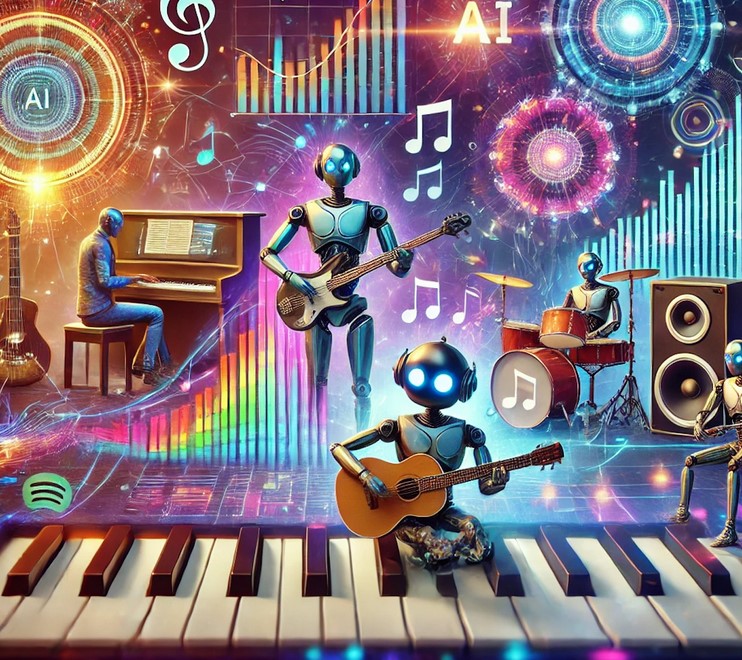AI’S GREATEST HITS
(GOOGL), (SPOT), (UMGNF), (NVDA), (MSFT), (SSTK)
It's time to face the music. AI is composing tunes, and it's not just a passing note in the tech symphony. This could be the next big score for us investors and the entertainment industry.
Let's lay down some beats here. The global market for AI-generated music is set to hit a high note of $3 billion by 2028. That's a tenfold jump from 2023.
And it's not just a solo performance. The whole AI in music market is expected to crescendo to $1.6 billion by 2025, growing at a CAGR of 27% from 2020.
Now, who's leading this AI orchestra?
For starters, we've got Alphabet Inc. (GOOGL) and its brainy offspring, DeepMind. They're not just whistling Dixie with their WaveNet tech. With a war chest of $110.9 billion as of Q4 2023, Alphabet's got plenty of cash to keep the music flowing.
Then there's Spotify Technology S.A. (SPOT). With 489 million monthly active users tapping their feet to its tunes in Q4 2023, Spotify's not just sitting on the sidelines. They're exploring AI-generated music faster than you can say "playlist."
And they're not alone - 60% of major music streaming platforms are already using AI to personalize your listening experience.
But what about the old guard? Universal Music Group (UMGNF) isn't about to let AI steal the show. With revenues of $10.65 in 2023, they're partnering up with AI music startups faster than you can say "collab." Smart move, if you ask me.
And let's not forget the hardware guys. As expected, there’s NVIDIA Corporation (NVDA), which has been a key player in this AI music revolution.
Their chips are the backstage crew making it all happen. With data center revenue jumping 41% year over year to $15.7 billion in fiscal 2024, NVIDIA is looking at an encore performance.
The money men are taking notice, too. Between 2019 and 2023, venture capitalists pumped $1.37 billion into music-related AI startups.
OpenAI's MuseNet scored a cool billion from Microsoft (MSFT) and friends, while Aiva Technologies hit the right note with $10 million in Series A funding in 2022.
We're also seeing some interesting duets in the M&A world. For example, Shutterstock's (SSTK) buyout of Amper Music in 2020 shows they're not just about pretty pictures anymore.
So, how are these AI maestros making their dough? Well, it's a mixed playlist.
Licensing fees are the chart-topper at 40% of revenue, with subscription services humming along at 30%. Those monthly subs? They'll set you back $10 to $30.
Streaming service partnerships chip in another 20%, with deals ranging from $500,000 to $2 million a year. Not a bad gig if you can get it.
But AI isn't just composing. It's mastering tracks, running marketing campaigns, and even playing DJ with personalized playlists.
Video game soundtracks? 15% of those released in 2023 had AI fingerprints all over them. And 25% of ad agencies are now using AI to cook up jingles and background scores.
And here's the kicker - people are actually digging it. A whopping 80% of consumers are cool with listening to AI-composed tunes, and half of them can't even tell the difference from human-made music in blind tests.
Even more surprising? 65% of listeners think AI can actually boost human creativity. Talk about harmony.
But it's not all smooth sailing. Reports indicate a potential 27% drop in human music creators' revenues by 2028 if we don't figure out how to pay them for their input.
That means we need to get our act together on copyright laws and fair compensation, pronto.
Looking ahead, the AI-music mashup is just warming up. These digital Mozart's can now churn out a full symphony in under 4 hours, down from 24.
And they can mimic over 500 composers across all sorts of genres. It's like having a time machine for music.
For those of you with an ear to the ground, this AI-composed symphony could be music to their portfolios.
As this tech hits its stride and gains more fans, it's a chance to get in on the ground floor of a revolution in one of humanity's oldest art forms.
So, what's the takeaway here? Well, I say keep your eyes on the AI music scene. It's not just noise - it's the sound of opportunity knocking.
And who knows? The next chart-topping hit might just come from a silicon chip instead of a recording studio.
Now that's something to sing about.


